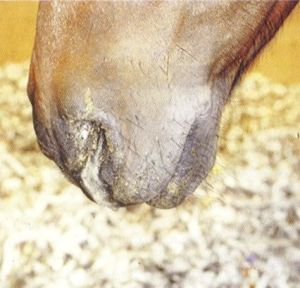A Choke And A Warning For Your Horses
Choke. It’s a word no horse person wants to hear, let alone experience. But almost two weeks ago it happened to my mare. The first sign was the salivating. It looked like the mare was foaming at the mouth. After a closer look I realized she wasn’t able to swallow and there was saliva coming out both her nose and mouth. I knew she was choking, and I knew there wasn’t much I could do but wait it out.
Horses don’t choke like humans do. When humans choke it’s an obstruction of the airways, but when horses choke it’s an obstruction of the esophagus. A horse can still breath when choking, but the obstruction can still cause significant issues such as aspiration pneumonia in the food ends up in the airway.
I have heard a lot of advice given towards choke over the years. Veterinarians can use a nasogastric tube to try and dislodge the obstruction. They may also decide to give the horse a sedative. But the most common advice I’ve heard is to wait it out, remove food and water, and if it doesn’t clear up quickly, rinse the mouth out with water (but don’t pour the water down her throat). This was the advice my veterinarian gave when I called him to go over the situation.
Since the mare was pretty quiet and relaxed I tried not to worry too much. I rinsed out her mouth a few times and waited with her for it to pass. I waited quite a while. It seemed like a very long time had passed before the nasal discharge started to include some food particles. At that point, I felt a little relieved, the obstruction had to be breaking up. It took some more time but when she finally screamed at me for food, I knew she was feeling better.
So what caused her choke? It was the pelleted feed I had been giving her. The choke came on right after she had eaten and the food particles that finally came out were from the pellets.
I have long heard the danger of feeding horses pelleted feeds. Google ‘horse choke’ and you will find all sorts of stories of chokes involving pellets. From working with veterinarians to talking with horsey friends, every story I heard of choke had involved pellets. In fact, there was a time I swore I would never feed them. But along came Argo and his very picky eating and inability to keep weight on. He agreed to eat pellets and the ones I fed kept the weight on fairly well. I gave in.
After that choke though, I will never feed pellets again. The horses have been switched over to a textured feed and neither one of them has had a problem eating it. I also made sure to get their teeth floated again, in case that was contributing to the problem.
Pellets can safely be fed if soaked ahead of time. But make sure everything is mashed up before feeding. Choke is not something you or your horse want to deal with. Please consider this a warning and re-evaluate your feeding program to avoid a similar problem.




Wow you learn something new everyday. I didn’t know pellets caused choke, thanks for the heads up.
Many people feed pellets for years and never have a problem. But if your horse is going to choke, it often will be because of pellets. I just wanted to give other horse people a heads up… Thanks for reading!
yeah my horse has been on pellets for a long time now, but you just never know what will happen.
thanks this helped me out a lot a friend of mine has a horse that was choking today and i had my computer with me n found this website thanks for the help